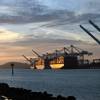Marine fuel prices are set to fall further after plunging to their lowest since late 2013, with traders in Singapore, the world's largest ship refuelling hub, saying they are looking to sell quickly in the face of a global supply glut.
End users of marine fuels, also known as bunkers, typically pay a premium over the cost of larger cargoes to account for logistics costs, but that flipped to a discount from early June.
"The market is flooded with oil and everyone is desperate to sell quickly, so you have a price war," said a Singapore-based trader.
The 380-cst marine fuel grade traded at a discount of $1.95 a tonne below the prices of large cargoes on Monday, after hitting a discount as wide as $5.38 a tonne late last week.
The rout in marine fuel prices has been stoked by inventories at refineries and commercial oil tanks leased by traders in Singapore that are at their highest since 1999.
Stocks stand at over 27 million barrels, compared to around 22 or 23 million barrels seen in September 2013, the last time prices were at current levels.
Robust oil processing margins have spurred western refiners to ramp up output, pushing excess oil to Asia, which is structurally short of fuel oil.
Would-be sellers are also worried that the record volumes of intra-Singapore fuel oil trades due to load from the second-half of June will worsen port congestion.
A record volume of over 4 million tonnes of both the 180-centistoke and 380-cst grades have traded since the start of June in a price assessment process known as the Market On Close facilitated by Platts, a McGraw Hill Financial unit.
"The cargo berths are going to be congested but people will still want to move the oil out," said another Singapore-based trader. "Selling ex-wharf is one way (of doing that)."
Ex-wharf oil refers to fuel loaded directly from oil terminals in parcels of 2,000 to 5,000 tonnes.
But the longer term price outlook is brighter, with traders saying underlying demand remains solid and with lower supplies into Asia expected in July.
Swap prices point to a possible recovery in September.
(By Jane Xie; Additional reporting by Henning Gloystein; Editing by Joseph Radford)











